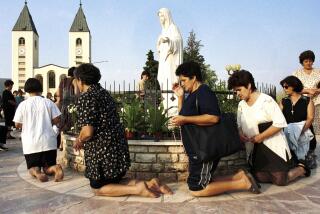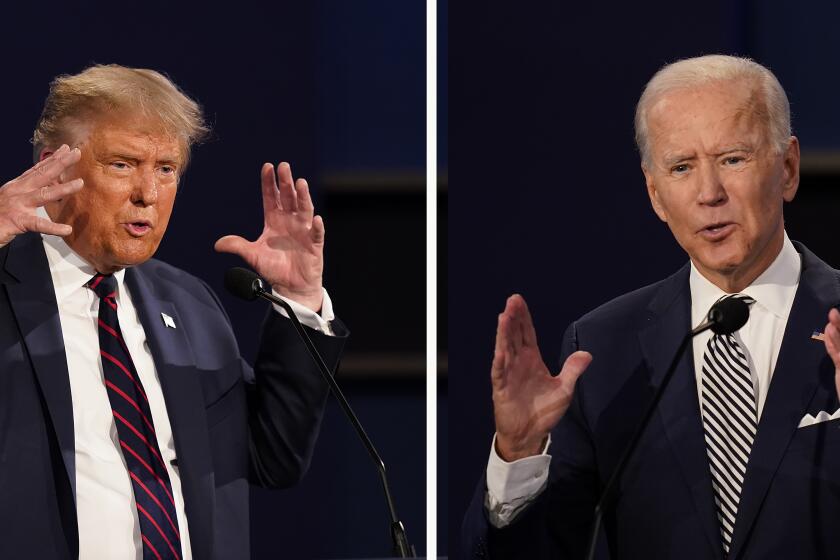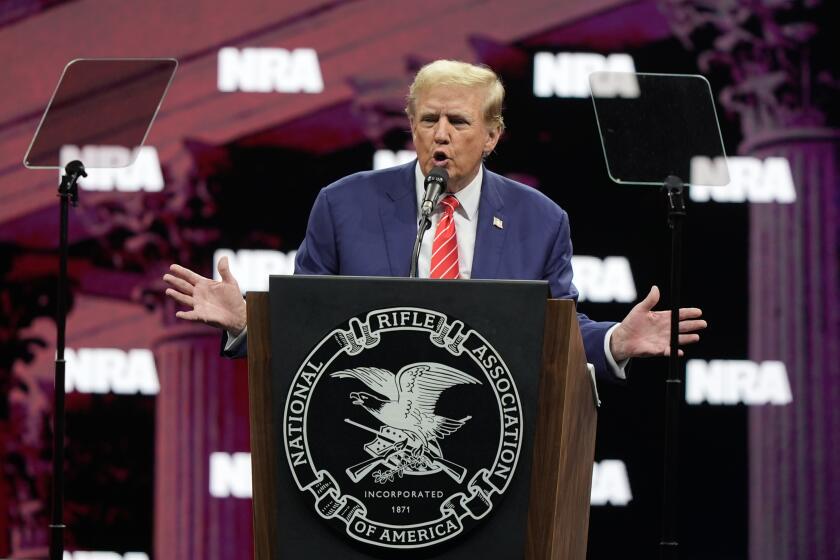Voter Apathy Troubles Mexico’s Ruling Party : PRI Struggles to Get Out the Vote Among People Jaded by Electoral Fraud
There were images of electoral excitement recently in this northern industrial city as Mexico’s ruling party launched its steamroller presidential campaign.
A huge crowd turned up in the city’s long central plaza and greeted the candidate, Carlos Salinas de Gortari, with banners and shouts of “Viva!” Bouncy country ballads filled the crisp night air, laser beams spelled out PRI--the initials of the Institutional Revolutionary Party--on skyscraper walls and fireworks lit the sky.
Conflicting Images
But just two weeks before, there were other, conflicting images that the ruling party would just as soon forget. In the neighboring state of Coahuila, gubernatorial and municipal elections were marred by violence and charges of fraud. PRI-affiliated unionists armed with sticks clashed with opposition supporters, and someone shot at the homes of opposition electoral officials.
Over the past three years, protests or violence in connection with state elections have become almost routine in parts of Mexico.
The contrasting scenes present a problem for the PRI: how to persuade people to put their faith in the vote when many suspect widespread electoral fraud. In Coahuila, for instance, it is estimated that about 60% of the voters did not go to the polls. For the PRI, which declares itself “the party of the majority,” such a turnout is embarrassing.
There is no doubt about who will win the presidential election next July. The PRI has not lost such a vote in its 60-year history. But PRI officials worry that apathy, a sign of the party’s declining prestige and hold on the public, will undercut the legitimacy of their victory.
“We reject foul practices,” said Salinas, promising that elections will be clean. “To defeat abstentionism, we have to make the people confident that their vote really counts, that their vote really makes a difference.”
Salinas made the remarks just two days before the Coahuila elections. The message apparently didn’t get through to PRI electoral organizers.
In the Coahuila steel town of Monclova, one PRI official on the way to a polling station was found carrying marked ballots. The discovery set off a melee with opposition supporters, who were ultimately placed under arrest. In some polling stations, the ballot boxes were hidden by blankets or boards and opposition observers were expelled, according to local press reports.
The main opposition group, the conservative National Action Party, charged that ballot boxes were stuffed and voting lists rigged to ensure a PRI victory in the mayoral race in Monclova and elsewhere.
The PRI mayoral candidate won by 1,000 votes in Monclova, ending a nine-year opposition reign in city hall. For the past several years, National Action has been Mexico’s No. 2 vote-getter in local elections.
‘It’s a Joke’
“It’s a joke on the citizens,” complained Teresa Ortuno, the National Action candidate for governor.
There is some question whether the PRI actually needed any voting shenanigans to win big in Coahuila. National Action’s candidate for governor was considered a weak vote-getter. But, as it had in northern elections in recent years, the PRI mounted an impressive organizational effort to get out the vote.
By pulling out all the stops, the party seemed to be sending a clear message: The PRI would win “all of everything,” as party jargon puts it, with the aim of destroying opposition footholds in the north.
Mexicans call the PRI election sweep in the north in recent years the quest for “the fully loaded automobile.”
“The notion of National Action strength in the north is a myth,” PRI Congressman Romeo Flores told foreign reporters. “They hold almost no offices anywhere.”
Flores blamed the violence in Monclova on the opposition, asserting that it had embraced a “culture of violence” in an effort to attract undue attention.
Unemployment, Inflation
Whether wiping out opposition hopes can persuade voters to rally around the PRI candidate in the presidential election is yet to be proved. Until his nomination last month, Salinas, 39, was the government’s budget and planning secretary. He is considered the author of economic policies that have brought a leaden combination of unemployment and runaway inflation to Mexico.
Tough as times are, economic problems have done little to restrain the PRI’s political machinery. Salinas chartered a train to travel from Mexico City to Monterrey, the capital of Nuevo Leon state. Sparkling white buses ferried his large entourage around the city. Free lunches at Monterrey’s best hotels sated the appetites of prominent supporters.
Salinas also traveled by helicopter to his ancestral home in Agualeguas, northeast of Monterrey. Security was provided by the military’s presidential guard, and the presidential public relations office laid much of the groundwork for the visit.
The audience for his rally in Monterrey was ferried in by all sorts of private and government vehicles. Students were told their grades could be affected if they failed to appear for Salinas’ speech at a local university. The PRI paid for hotel accommodations and meals for Mexican journalists and set up an elaborate communications center so they could deliver articles to their newspapers free of charge.
Logistical Resources
None of the opposition parties--at least five are expected to name candidates--can match even a fraction of the PRI’s logistical resources. No one knows how much the PRI, which has access to government money, will spend on the campaign.
The campaign has already developed a catch phrase, “Modern Politics.” It is repeated by everyone involved, although precisely what it means has not been made clear even to party regulars.
When asked by a reporter if he could give an example of how Salinas’ administration will differ from that of President Miguel de la Madrid, Gov. Jorge Trevino of Nuevo Leon answered flatly, “No.”
For the most part, Salinas’ stump speeches have echoed De la Madrid’s policy statements, sometimes almost word for word.
Proceso magazine compiled some of the copycat statements in a recent issue. For example, both Salinas and De la Madrid six years earlier began the presidential campaigns in their home states, and both saw special significance in beginning at home.
In 1981 at his birthplace in Colima, on the Pacific coast, De la Madrid remarked: “It is told in some episode of mythology that when the Greek gods wanted to gain strength, they would come to Earth. I have come to touch the Earth in Colima.”
Salinas, in comments to home state acquaintances on why he would begin his campaign in Nuevo Leon, said: “Like the classic myths point out, one has to tread the earth of one’s origins in order to renew vigor and strength.”
De la Madrid, speaking on women’s issues in the course of his campaign, commented: “We need women to modernize the country, to make a more just nation, to plan democratically and to have a more full life from the human point of view.”
Recently, the newspaper El Universal reported Salinas’ words on the same subject: “The participation of women is required to modernize the country, to make the nation more just, to enrich democracy and to obtain a more full life from the human point of view.”
Whether all this reflects a lack of ideas from Salinas, who holds three graduate degrees from Harvard, or is just a nod to his predecessor typical of PRI candidates running for office, remains to be seen.
Salinas did, however, come up with some good news for Nuevo Leon voters. He promised that his government will fund subway construction in Monterrey and a new cross-border bridge in Nuevo Laredo, which, although it lies in another state, is Monterrey’s closest entry point to the United States.
More to Read
Start your day right
Sign up for Essential California for news, features and recommendations from the L.A. Times and beyond in your inbox six days a week.
You may occasionally receive promotional content from the Los Angeles Times.






